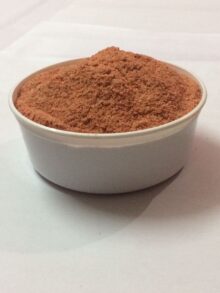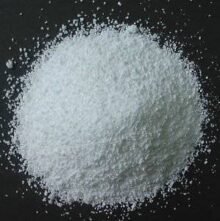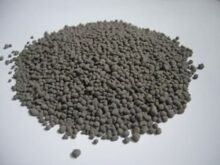Fertilizers & Soil
Showing all 5 results
SPHINX POTASH POWDER -MULTI PURPOSE PLANT FERTILIZER AND PLANT FOOD- 250 GRAMS
₹149.00- Package contains – 250 grams of Potash salt/fertilizer.
- Potash enhances bigger fruits and vegetable yields. It also trigger flowers in abundance and increased plant growth.
- Potash is to be used for the plants which are deficient in potash salts. It is wise to conduct soil test before applying potash.
- The average amount for potassium poor soil is ¼ to 1/3 pound of potassium chloride or potassium sulphate per 100 square feet.
Do’s:
- Conduct soil test to know the pH and potassium deficiency in your plants before using the product.
- Directly deposit into root zone as potash doesn’t penetrate into soil more than an inch.
- Annual/bi-annual application would be sufficient for your garden.
- It is better to consult a horticulturist for big gardens or farms before usage of potash.
Dont’s:
- Avoid using if pH is alkaline.
- Do not use for acid loving plants e.g. hydrangea, azalea and rhododendron
SPHINX VERMICOMPOST PLANT CARE FOOD -800gms
₹199.00 -34%- Package Contains 800 grams of Vermicompost fertilizers for plant.
- It is helpful in improving plants health and yield.
- Suppressing plant diseases.
- Enriching soil.
How to use:
- Can be used directly with potting mix or soil. It can be used and stored throughout the year or gardening season.
- It can also be put as a top dressing for indoor or outdoor plants.
SPHINX VITAL PLANT CARE FOOD KIT – 3 ITEMS (DAP, UREA & ORGANIC COMPOST)
₹199.00 -51%- Package contains 3 items: 150 gms of DAP, 150 gms of UREA & 500 gms of ORGANIC COMPOST
- This pack is a complete food for plants and contains all vital nutrients for essential plants growth
Dosage Apply:
1) DAP fertilizer has a pH of about 8, which makes it a strong alkaline. This means that DAP can have an impact on the pH of the soil in which it is applied. Plants that prefer acidic soils may not benefit from DAP fertilizer, and adding too many alkaline-based products to soil that is already alkaline-rich can lead to underdevelopment in some plants. DOSAGES – Apply 1/2 tsp in 1 liter of water every 15 days2) Urea – For seeds and seedlings- use 1/4 tsp. to 1 liter water. After 3-4 true leaves come out – use 1/2 tsp. to 1 liter water. When you will see blooming sign upto full bloom – use 2/3 tsp. to 1 liter water. Untill blooming complete or harvesting complete – use 1 tsp. to 1 liter water.
3) Organic Compost : The easiest way to apply organic fertilizers is to spread them on the soil surface or planting beds. Since most plant feeder roots are in the top few inches of the soil, there’s no need to dig the nutrients down deeply; unless you’re applying a phosphorous fertilizer.
SPHINX(300GM) -All PURPOSE HYDROPONIC NPK FERTILIZER (19-19-19) – 100% Water Soluble
₹149.00 -51%- Urea is used worldwide. NOTEWORTHY: For good results, always follow the dosage instruction. Avoid frequent uses.The user first understand very well the plant and it’s requirements. Not every plant needs urea.Urea should be diluted to at least half distillation and the soils should be well watered after application. A good use of urea is in foliar sprays, where the plant can immediately use what it needs and the rest evaporates.
- Nitrogen is an essential nutrient for numerous plant functions and is one of the elemental components of chlorophyl..Urea, a white crystalline solid containing 46% nitrogen, is widely used in the agricultural industry as an animal feed additive and fertilizer Here we discuss it only as a nitrogen fertilizer.
- Urea can be applied to soil as a solid or solution or to certain crops as a foliar spray. Urea manufacture releases few pollutants to the environment.
- Urea, when properly applied, results in crop yield increases equal to other forms of nitrogen.
- The dosage standard to be used are as follows: For seeds and seedlings- use 1/4 tsp. to 1 liter water. After 3-4 true leaves come out – use 1/2 tsp. to 1 liter water. When you will see blooming sign upto full bloom – use 2/3 tsp. to 1 liter water. Untill blooming complete or harvesting complete – use 1 tsp. to 1 liter water. Please note that you have to wait after single dosage till the next stage of dosage arrive. You must not dose the plants occassionally. Careless dosage may harm the plants.
SPHINX-300GM,All PURPOSE DAP N:P:K(18:46:0) Fertilizer 100% Water Soluble
₹149.00 -51%- Package Contains – SPHINX-300GM,All Purpose D.A.P- N:P:K(18:46:0) Fertilizer 100% Water Soluble
- D.A.P. stands for Diammonium Phosphage. Usage directions will be provided with the package.
- D.A.P releases free ammonium. Nitrogen in the ammonium form resists leaching and is a slower release form of nitrogen.
- The low cost of nitrogen in DAP makes it a cost effective source of nitrogen if Phosphorus is also required.
Product description
DAP stands for diammonium? DIAMMONIUM PHOSPHATE : ? DAP?phosphate, a type of fertilizer with a high phosphorous content. fertilizer contains nitrogen, which is created during the chemical manufacturing process. In most cases, additional nitrogen helps grow greener, faster-growing plants. DAP contains 18 percent nitrogen and 46 Granulated universal highly concentrated?percent phosphate. nitrogen-phosphorus fertilizer. Value of nitrogen and phosphorus 18-46 increases the resistance of plants to adverse environmental factors (drought and frost), and also increases the resistance of plants to disease. High content of phosphorus contributes to the accumulation of sugar in the root crops and fruits. Suitable for all soils and under all kinds of cultures as the basic fertilizer and as feed in the spring and ?summer period to speed up the ripening of fruits and berries. Available in free flowing granular form. It is completely soluble in Water. Total water soluble P2O5 helps plants to utilise moisture better and makes roots grow stronger and deeper even in acidic soils. DAP is used to provide plants with the phosphorus they need. Because it also includes sulfur, it provides plants with their sulfur requirements. If it does not provide enough sulfur, it should be combined with the necessary amount of sulfur-containing fertilizer. The phosphorus in this fertilizer reacts more quickly than the phosphorus in other fertilizers. Dosage Application DAP fertilizer has a pH of about 8, which makes it a strong alkaline. This means that DAP can have an impact on the pH of the soil in which it is applied. Plants that prefer acidic soils may not benefit from DAP fertilizer, and adding too many alkaline-based products to soil that is already alkaline-rich can lead to underdevelopment in some plants.How to Use
DAP fertilizer has a pH of about 8, which makes it a strong alkaline. This means that DAP can have an impact on the pH of the soil in which it is applied. Plants that prefer acidic soils may not benefit from DAP fertilizer, and adding too many alkaline-based products to soil that is already alkaline-rich can lead to underdevelopment in some plants. DOSAGES – Apply 1/2 tsp in 1 liter of water every 15 days





